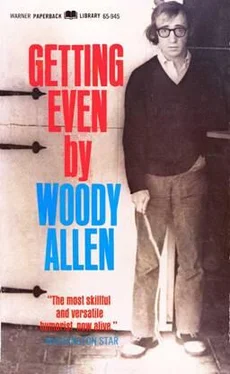
Venal amp; Sons has at last published the long-awaited first volume of Metterling’s laundry lists (The Collected Laundry Lists of Hans Metterling, Vol. I, 437 pp., plus XXXII-page introduction; indexed; $18.75), with an erudite commentary by the noted Metterling scholar Gunther Eisenbud. The decision to publish this work separately, before the completion of the immense four-volume a euvre, is both welcome and intelligent, for this obdurate and sparkling book will instantly lay to rest the unpleasant rumors that Venal amp; Sons, having reaped rich rewards from the Metterling novels, play, and notebooks, diaries, and letters, was merely in search of continued profits from the same lode. How wrong the whisperers have been! Indeed, the very first Metterling laundry list
List No. 1
6 prs. shorts
4 undershirts
6 prs. blue socks
4 blue shirts
2 white shirts
6 handkerchiefs
No Starch
serves as a perfect, near-total introduction to this troubled genius, known to his contemporaries as the “Prague Weirdo.” The list was dashed off while Metterling was writing Confessions of a Monstrous Cheese, that work of stunning philosophical import in which he proved not only that Kant was wrong about the universe but that he never picked up a check. Metterling’s dislike of starch is typical of the period, and when this particular bundle came back too stiff Metterling became moody and depressed. His landlady, Frau Weiser, reported to friends that “Herr Metterling keeps to his room for days, weeping over the fact that they have starched his shorts.” Of course, Breuer has already pointed out the relation between stiff underwear and Metterling’s constant feeling that he was being whispered about by men with jowls (Metterling: Paranoid-Depressive Psychosis and the Early Lists, Zeiss Press). This theme of a failure to follow instructions appears in Metterling’s only play, Asthma, when Needleman brings the cursed tennis ball to Valhalla by mistake.
The obvious enigma of the second list
List No. 2
7 prs. shorts
5 undershirts
7 prs. black socks
6 blue shirts
6 handkerchiefs
No Starch
is the seven pairs of black socks, since it has been long known that Metterling was deeply fond of blue. Indeed, for years the mention of any other color would send him into a rage, and he once pushed Rilke down into some honey because the poet said he preferred brown-eyed women. According to Anna Freud (“Metterling’s Socks as an Expression of the Phallic Mother,” Journal of Psychoanalysis, Nov., 1935), his sudden shift to the more sombre legwear is related to his unhappiness over the “Bayreuth Incident.” It was there, during the first act of Tristan, that he sneezed, blowing the toupee off one of the opera’s wealthiest patrons. The audience became convulsed, but Wagner defended him with his now classic remark “Everybody sneezes.” At this, Cosima Wagner burst into tears and accused Metterling of sabotaging her husband’s work.
That Metterling had designs on Cosima Wagner is undoubtedly true, and we know he took her hand once in Leipzig and again, four years later, in the Ruhr Valley. In Danzig, he referred to her tibia obliquely during a rainstorm, and she thought it best not to see him again. Returning to his home in a state of exhaustion, Metterling wrote Thoughts of a Chicken, and dedicated the original manuscript to the Wagners. When they used it to prop up the short leg of a kitchen table, Metterling became sullen and switched to dark socks. His housekeeper pleaded with him to retain his beloved blue or at least to try brown, but Metterling cursed her, saying, “Slut! And why not Argyles, eh?”
In the third list
List No. 3
6 handkerchiefs
5 undershirts
8 prs. socks
3 bedsheets
2 pillowcases
linens are mentioned for the first time: Metterling had a great fondness for linens, particularly pillowcases, which he and his sister, as children, used to put over their heads while playing ghosts, until one day he fell into a rock quarry. Metterling liked to sleep on fresh linen, and so do his fictional creations. Horst Wasserman, the impotent locksmith in Filet of Herring, kills for a change of sheets, and Jenny, in The Shepherd’s Finger, is willing to go to bed with Klineman (whom she hates for rubbing butter on her mother) “if it means lying between soft sheets.” It is a tragedy that the laundry never did the linens to Metterling’s satisfaction, but to contend, as Pfaltz has done, that his consternation over it prevented him from finishing Whither Thou Goest, Cretin is absurd. Metterling enjoyed the luxury of sending his sheets out, but he was not dependent on it.
What prevented Metterling from finishing his long-planned book of poetry was an abortive romance, which figures in the “Famous Fourth” list:
List No. 4
7 prs. shorts
6 handkerchiefs
6 undershirts
7 prs. black socks
No Starch
Special One-Day Service
In 1884, Metterling met Lou Andreas-Salome, and suddenly, we learn, he required that his laundry be done fresh daily. Actually, the two were introduced by Nietzsche, who told Lou that Metterling was either a genius or an idiot and to see if she could guess which. At that time, the special one-day service was becoming quite popular on the Continent, particularly with intellectuals, and the innovation was welcomed by Metterling. For one thing, it was prompt, and Metterling loved promptness. He was always showing up for appointments early-sometimes several days early, so that he would have to be put up in a guest room. Lou also loved fresh shipments of laundry every day. She was like a little child in her joy, often taking Metterling for walks in the woods and there unwrapping the latest bundle. She loved his undershirts and handkerchiefs, but most of all she worshipped his shorts. She wrote Nietzsche that Metterling’s shorts were the most sublime thing she had ever encountered, including Thus Spake Zarathustra. Nietzsche acted like a gentleman about it, but he was always jealous of Metterling’s underwear and told close friends he found it “Hegelian in the extreme.” Lou Salome and Metterling parted company after the Great Treacle Famine of 1886, and while Metterling forgave Lou, she always said of him that “his mind had hospital corners.”
The fifth list
List No. 5
6 undershirts
6 shorts
6 handkerchiefs
has always puzzled scholars, principally because of the total absence of socks. (Indeed, Thomas Mann, writing years later, became so engrossed with the problem he wrote an entire play about it, The Hosiery of Moses, which he accidentally dropped down a grating.) Why did this literary giant suddenly strike socks from his weekly list? Not, as some scholars say, as a sign of his oncoming madness, although Metterling had by now adopted certain odd behavior traits. For one thing, he believed that he was either being followed or was following somebody. He told close friends of a government plot to steal his chin, and once, on holiday in Jena, he could not say anything but the word “eggplant” for four straight days. Still, these seizures were sporadic and do not account for the missing socks. Nor does his emulation of Kafka, who for a brief period of his life stopped wearing socks, out of guilt. But Eisenbud assures us that Metterling continued to wear socks. He merely stopped sending them to the laundry! And why? Because at this time in his life he acquired a new housekeeper, Frau Milner, who consented to do his socks by hand-a gesture that so moved Metterling that he left the woman his entire fortune, which consisted of a black hat and some tobacco. She also appears as Hilda in his comic allegory, Mother Brandt’s Ichor.
Читать дальше













